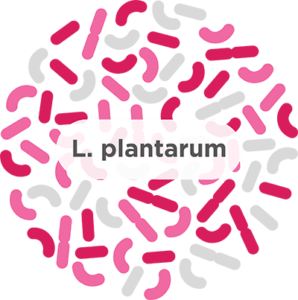Lactobacillus Plantarum (L. plantarum) is a probiotic bacterium that helps to improve digestion and bolster the body’s immune system. More importantly, it serves important functions in fighting off molds, fungi, and their respective toxins that can threaten the nervous system.

L. plantarum Helps to Reduce the Growth of Harmful Substances in the Gut
Similar to other probiotic bacteria, like B. bifidum and B. longum, L. plantarum helps to keep the gut healthy by binding to the intestinal cells in the intestines. Through this binding, L. plantarum is able to stop harmful pathogens from attaching and colonizing on the gut lining, prevents them from getting into the body, reducing gut inflammation, and improving immune health.
Here’s how it works: When bad bacteria are passing through the gut, they have to latch on to cells in the intestines before they have time to do their dirty work. If they don’t attach to these cells, they’ll just pass on through without causing any harm. L. plantarum latches on to these same cells so the bad bacteria can’t. In a healthy gut, many of the intestinal cells will have L. plantarum or other healthy bacteria attached. This means that there are very few cells left for bad bacteria to grab onto before they’re swept out of the gut. Controlling the number of bad bacteria is very important for balancing the body’s immune system functions.
That’s just one of the many ways that L. plantarum helps to reduce the growth of pathogens. Another is by stimulating the secretion of mucin.1 Mucin acts as another protective barrier that helps to hinder the growth of unwanted bacteria. L. plantarum secretes antitoxins, like hydrogen peroxide and benzoic acid. These antitoxins help to slow down pathogen expansion. It also produces fatty acids that lower the pH in the colon.2 Lowering pH levels in the colon creates a more acidic environment that is unfavorable for the growth of pathogens like molds, yeasts, and many harmful bacteria. Last, but not least, L. plantarum produces antifungal compounds that help to fight off mold and other pathogens, including one that is particularly dangerous.3
L. plantarum Helps to Prevent the Binding of a Very Dangerous Toxin
Ochratoxin A is one of the most widespread food-contaminating mycotoxins. People can become exposed to this substance by consuming contaminated food products. It is also commonly found in homes that have suffered from water damage. Foods that are most susceptible to becoming contaminated with Ochratoxin A include grains, pork products,4 coffee, wine,5, and dried grapes. Once ingested, Ochratoxin A can have devastating effects on the body. More specifically, it has a strong tendency to travel to and affect the brain.6
It is believed that its tendency to affect the hippocampus could be relevant to the onset of Alzheimer’s disease. It is also thought that Ochratoxin may be linked to Parkinson’s disease, and it could be potentially carcinogenic to humans by causing DNA damage.7 The developing brain is very vulnerable to Ochratoxin A, so it is important to take particular precautions against it during pregnancy.
In addition to its ability to fight off harmful pathogens in the body, it has been associated with weight loss in animal studies,8 and it may help to reduce chances of colorectal cancer in the body.9 It should be clear by now that L. plantarum provides some essential health benefits and could be key in staving off debilitating diseases down the road. It is found in foods like kimchi, sauerkraut, and sourdough bread, but eating these foods alone isn’t sufficient to give your body the healthy dose that it needs, so make sure to keep this strain in mind next time you’re shopping for a probiotic supplement.
1https://pubmed.ncbi.nlm.nih.gov/10198338/
2https://pubmed.ncbi.nlm.nih.gov/12777160/
3https://ciptaindomedica.files.wordpress.com/2011/01/lactic-acid-bacteria-e28093-potential-for-control-of-mould-growth-and-mycotoxins.pdf
4https://onlinelibrary.wiley.com/doi/abs/10.1002/mnfr.200600137
5https://www.researchgate.net/publication/6922277_Factors_Affecting_the_Presence_of_Ochratoxin_A_in_Wines
6https://link.springer.com/article/10.1007/s002040050594
7https://www.ncbi.nlm.nih.gov/pmc/articles/PMC2367102/
8https://pubmed.ncbi.nlm.nih.gov/22634320/
9https://www.tandfonline.com/doi/abs/10.4161/cbt.5.10.3296
People who liked this blog also read these:

